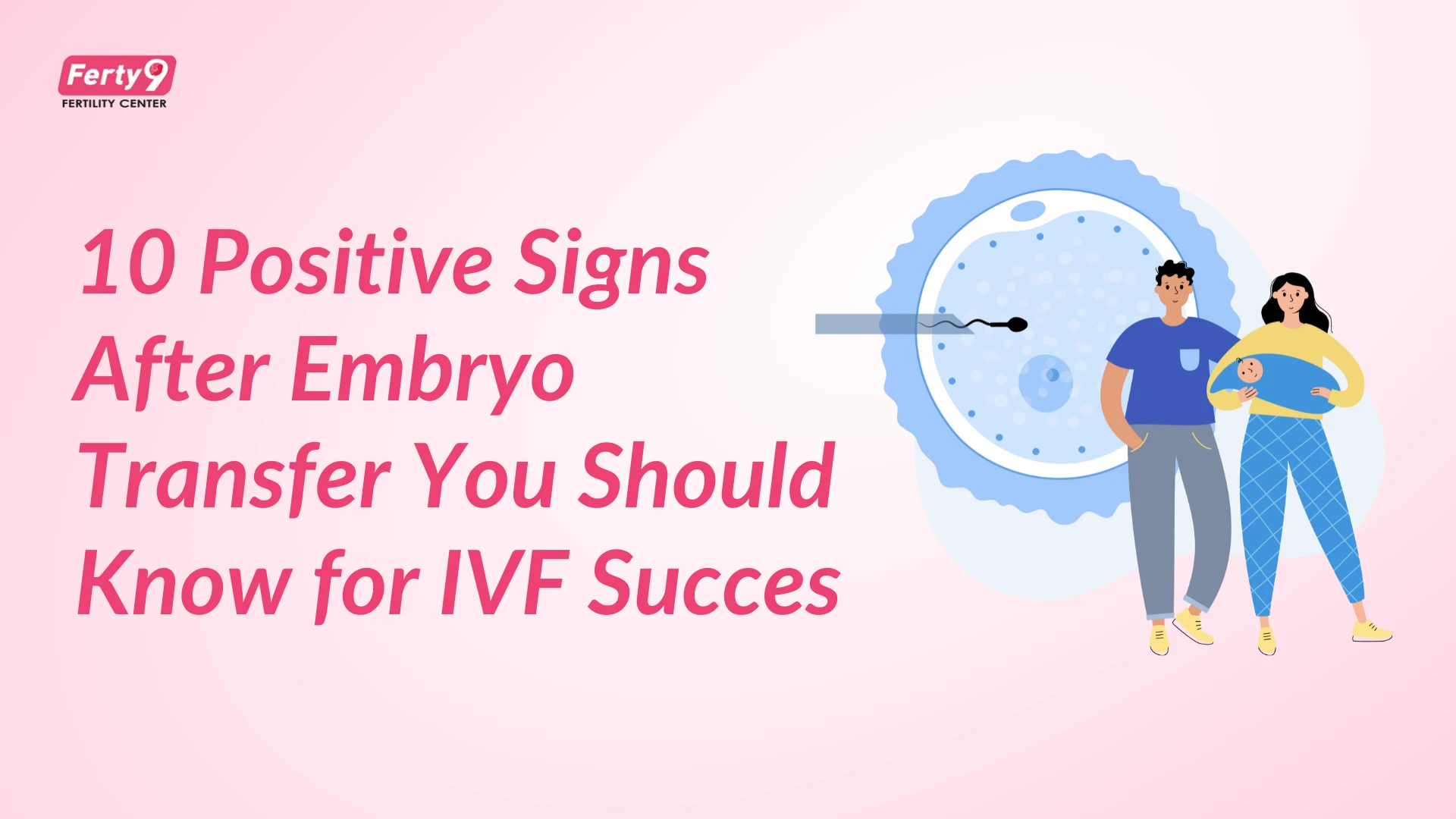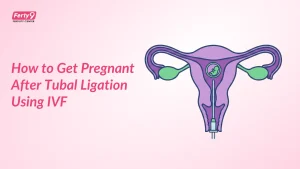The embryo transfer is the final, most hopeful step in your IVF journey. After the procedure, the next phase begins: the “two-week wait.” This period is filled with anticipation as you wait to find out if the embryo has successfully implanted. During this time, many women become highly attuned to their bodies, looking for any sign of success.
Recognizing these early positive signs can be reassuring, but it’s also important to have realistic expectations. Many symptoms can be caused by the fertility medications you’re taking. This guide is here to help you understand what your body is going through and what to look out for.
Learn more about the Period Calculator in our detailed guide.
Understanding the Embryo Transfer Process
The embryo transfer is a simple and painless procedure where our Ferty9 specialist places a healthy embryo into your uterus. The hope is that this embryo will attach itself to the uterine wall in a process called implantation. This is the moment a pregnancy officially begins.
The critical period of waiting for this to happen is known as the “two-week wait.” It’s the time between the embryo transfer and when you can take a reliable pregnancy test.
How the Body Reacts After Embryo Transfer
After your transfer, your body is working hard to create a welcoming environment for the embryo. This is largely driven by hormones, especially progesterone. You will likely be on progesterone supplements, which are vital for supporting the uterine lining and helping the embryo implant. Many of the symptoms you feel during this time are due to these high hormone levels.
10 Positive Signs After Embryo Transfer You Should Know
While a blood test is the only way to know for sure, here are 10 common signs that could indicate successful implantation.
1. Light Spotting or Implantation Bleeding
This is one of the earliest signs. As the embryo burrows into the uterine lining, it can cause a small amount of bleeding.
- What it looks like: It’s usually light pink or brown spotting, not a heavy red flow.
- How to differentiate: It’s much lighter and shorter than a period, often lasting only a day or two.
2. Mild Cramping or Twinges
It’s very common to feel mild cramping or a pulling sensation in your lower abdomen. This can be a sign of the embryo implanting and the uterus beginning to adjust. These cramps are usually much milder than typical period cramps.
3. Increased Basal Body Temperature
If you track your basal body temperature (your temperature when you first wake up), you may notice that it stays elevated. High progesterone levels after implantation keep your body temperature slightly higher.
4. Breast Tenderness and Swelling
Your breasts may feel sore, swollen, or tender to the touch. This is due to the rising levels of pregnancy hormones, which are preparing your body for a potential pregnancy. This symptom often appears one to two weeks after the transfer.
5. Heightened Fatigue or Sleepiness
Feeling unusually tired? A sharp increase in progesterone is a common cause of fatigue in early pregnancy. Your body is using a lot of energy to support the growing embryo, which can leave you feeling exhausted.
6. Increased Vaginal Discharge
You may notice an increase in a thin, white, or milky vaginal discharge. This is often due to the progesterone supplements you are taking, which help thicken the cervical mucus, but it’s a common early pregnancy sign as well.
7. Nausea or Food Aversions
Often called “morning sickness,” nausea can actually occur at any time of day. It’s caused by rising hormone levels. You might also find that you suddenly dislike foods you normally enjoy.
8. Mood Changes and Emotional Sensitivity
The high levels of progesterone can have a significant impact on your emotions. It’s normal to feel more sensitive, moody, or weepy during the two-week wait. Be kind to yourself during this time.
9. Enhanced Sense of Smell or Taste
You might find that your sense of smell is suddenly much stronger, or you may have a strange metallic taste in your mouth. These sensory changes are a common, though less talked about, early sign of pregnancy.
10. Missed or Delayed Period
This is the most classic sign of pregnancy. If your period is late following an IVF cycle, it’s a very strong indicator that the transfer was successful. This is the best time to take a pregnancy test.
Other Potential but Non-Conclusive Signs
- Bloating: High progesterone can cause bloating and mild abdominal discomfort.
- Frequent Urination: You might feel the need to urinate more often due to hormonal changes.
- Metallic Taste: A strange, metallic taste in the mouth is reported by some women.
When Symptoms May Be Due to Medications
It’s crucial to remember that many of the signs listed above are also common side effects of the progesterone supplements and other fertility medications you are taking. Symptoms like breast tenderness, bloating, fatigue, and mood swings can be caused by the medication alone. The only way to distinguish is to wait for the pregnancy test.
Tracking and Recording Your Symptoms
Keeping a simple diary of your symptoms during the two-week wait can be helpful. It allows you to see patterns and can be a useful record to discuss with your Ferty9 doctor. Note down the symptom, the day it occurred, and its intensity.
When to Take a Pregnancy Test After Embryo Transfer
As tempting as it is to test early, it’s best to wait.
- Best Timing: We recommend waiting the full two weeks after your transfer before taking a home pregnancy test. Testing too early can give a false negative.
- Beta hCG Blood Test: The most accurate test is the beta hCG blood test that we will schedule for you at Ferty9. This test measures the exact amount of the pregnancy hormone in your blood and is the definitive way to confirm a pregnancy.
Lifestyle Tips to Support Implantation Success
- Diet and Hydration: Eat warm, nourishing, home-cooked meals. Stay well-hydrated with water and coconut water.
- Rest and Gentle Activity: Get plenty of rest. Avoid strenuous exercise, but gentle walking is encouraged to help blood flow.
- Stress Management: This is a stressful time. Practice deep breathing, meditation, or engage in relaxing hobbies to keep your mind calm.
Summary
The two-week wait is a journey of patience. While signs like light spotting, mild cramping, and fatigue can be hopeful indicators, the only way to know for sure is through a medical test.
Stay positive, be gentle with yourself, and trust the process. The entire team at Ferty9 is here to support you. No matter the outcome, we are with you every step of the way.



























